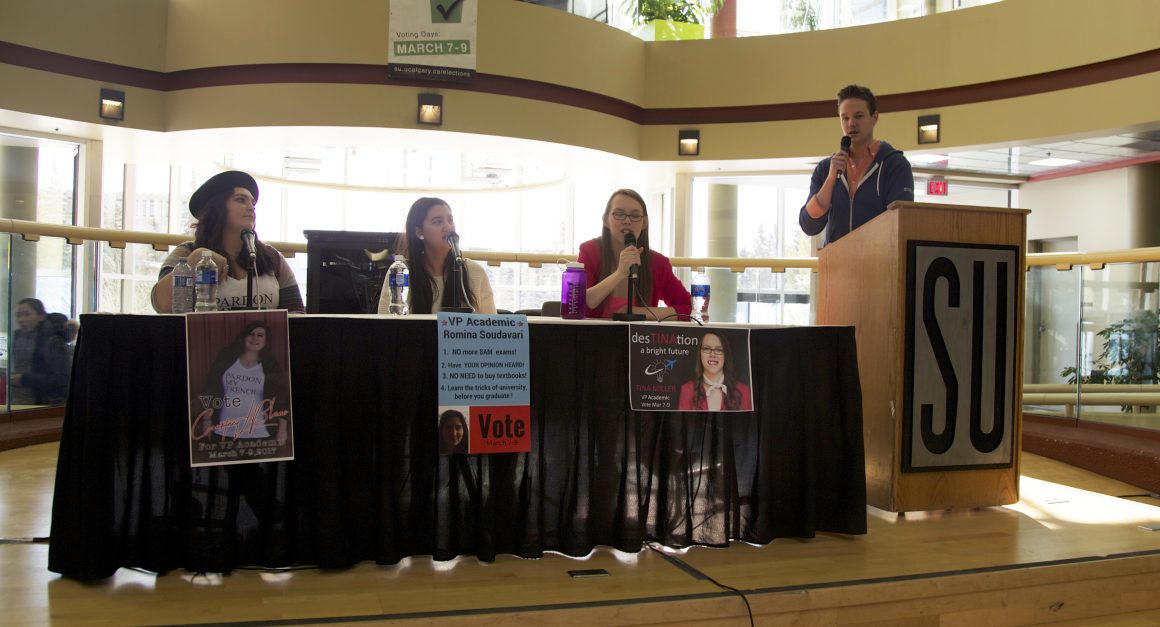
Three candidates talk research and teaching at vice-president academic forum
By Saima Asad, March 4 2017 —
The three vice-president academic candidates for the 2017 Students’ Union election squared off at a forum in MacHall on March 3. The hour-long event was the fourth executive forum to be held this election season. Current vice-president academic Alicia Lunz wrote the questions for the forum, which was moderated by current vice-president external Tristan Bray.
After Bray provided a brief description of the academic portfolio, candidates Courtney LeBlanc, Romina Soudavari and Tina Miller were given 90 seconds to introduce themselves and their platforms. Later, they were asked to critique their opponents and subsequently defend their ideas.
LeBlanc introduced her platform first, stating she has three points she wants to initiate and three she wants to continue. LeBlanc’s platform entails increasing student access to previous course outlines, working with enrolment services and the registrar to include course-next-offered dates in the calendar and working with the vice-president external to work on improving transfer credits.
The initiatives LeBlanc wants to continue from Lunz’s term are increasing funding for the Undergraduate Research Symposium (URS) and encouraging professors to use Open Educational Resources.
“I want to continue the work of Alicia Lunz and increase the URS funding and hopefully hit that $30,000 mark this year,” said LeBlanc.
Miller and Soudavari later critiqued LeBlanc on the feasibility of her plan to make past course outlines available due to their status as intellectual property and lack of buy-in from professors.
“A lot of courses have high turnover of professors and he course outline is intellectual property of that professor.” said Miller.
LeBlanc defended this point by citing previous conversations she had within her own faculty.
Soudavari said her platform focuses on improving the learning experience for all students. She wants students to be able to rate teaching assistants in the middle of the semester and have more open resources available in the University of Calgary libraries. Her banner point is for the U of C to eliminate 8:00 a.m. exams.
“That way students are better prepared mentally and physically,” she said.
Both LeBlanc and Miller criticized the feasibility of Soudavari’s goal of removing 8:00 a.m. exams.
“Unfortunately, I just don’t think there’s going to be that buy-in from enrolment services and the registrar,” LeBlanc said.
Soudavari defended this point by claiming some lecture halls around campus could be used.
Miller was the last to pitch her platform. Her goals include increasing the accessibility of academic services and resources.
“I want to increase a centralized research database for those already in research and those interested in getting involved,” she said. “Secondly, I want to increase the peer mentoring on past sessions on campus because I think it is really valuable to learn from students. Thirdly, I want to increase and advocate for funding with the right for OER and to make your education more affordable.”
LeBlanc criticised Miller’s peer mentoring session idea, saying it would not have a large enough reach to merit the effort it required. Soudavari criticized Miller for putting too much focus on research.
“Your platform focuses very much on research … however, I think it leaves out some students that are not interested in research,” Soudavari said.
Miller’s rebuttal was that research makes up only a third of her platform and that it affects every faculty in different ways.
Bray also asked the candidates why they chose to run, how familiar they are with the work of the current vice-president academic, what skills and qualifications they would apply to the position and a situational question on how they would handle a crying student who has failed a class and wants to appeal.
Following this, Bray initiated a speed round that challenged the candidates’ knowledge of the position. The questions surrounded the events and committees that fall under the vice-president academic, OER and the student ombudsperson. None of the candidates knew the name or office location of the ombudsperson.
The candidates were then questioned on specific platform points and the forum concluded with questions from the audience. Audience members asked about the candidates’ stances on mental health and their level of consultation with the current vice-president academic.
Roughly 25 people attended.
For the Gauntlet’s review of the vice-president academic candidates, click here.
